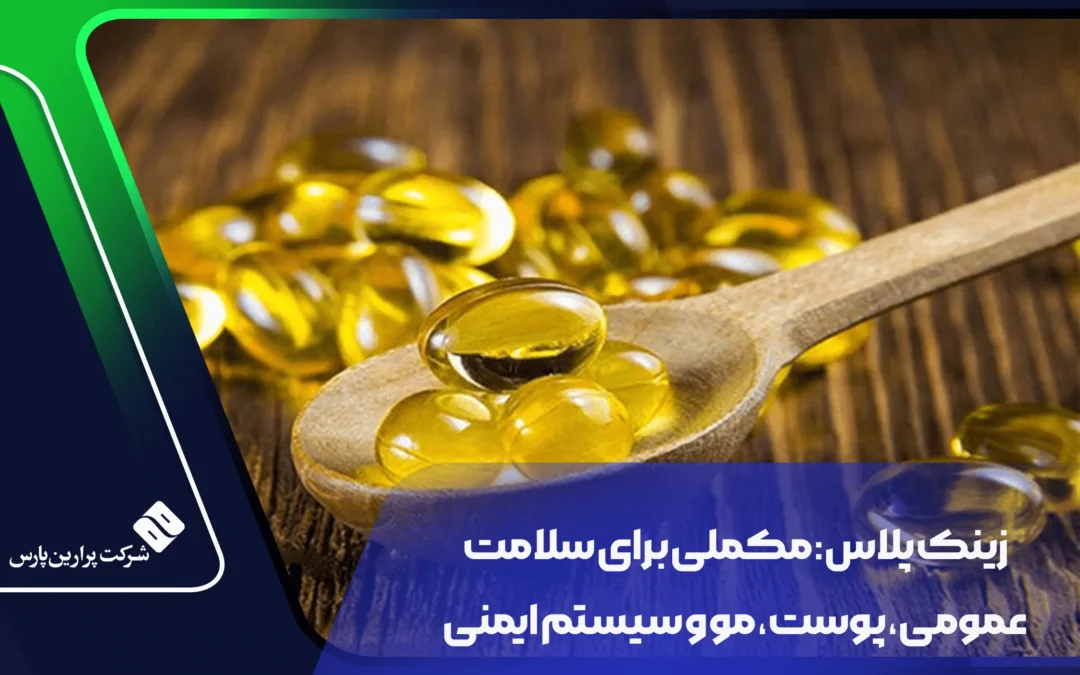
Zinc Plus: A Supplement for General Health, Skin, Hair, and the Immune System
Zinc Plus is one of the most widely used dietary supplements that has gained significant attention in recent years due to its positive effects on general health, skin, hair, and the immune system. Zinc, as an essential mineral, plays a crucial role in the body’s optimal functioning and is involved in numerous biochemical processes. This advanced supplement combines zinc with vitamins and other nutrients to enhance and support overall health. This article provides a comprehensive review of Zinc Plus, its benefits, usage, and potential side effects.
What is Zinc Plus?
Zinc Plus is a dietary supplement that typically includes zinc and a combination of vitamins such as Vitamin C and Vitamin B6. This supplement is specifically designed to meet the body’s daily zinc requirements while also supporting other biochemical functions. It helps strengthen the immune system, improve skin and hair health, and boost energy levels. In fact, Zinc Plus is considered a powerful formula for improving quality of life and promoting general health.
The Importance of Zinc in the Body
Zinc is an essential mineral that plays a role in the function of nearly 300 enzymes in the body. It is involved in various biochemical processes, including protein synthesis, cell division, and DNA repair. Additionally, zinc acts as an antioxidant, protecting cells from oxidative damage. A deficiency in zinc can lead to serious issues such as a weakened immune system, hair loss, and skin disorders. In this regard, taking Zinc Plus as a supplement can help compensate for these deficiencies.
The Role of Zinc in Biochemical Processes
Zinc acts as a cofactor for enzymes and is essential for numerous chemical reactions occurring in the body. It plays a role in the metabolism of carbohydrates, fats, and proteins and contributes to energy production. Additionally, zinc is crucial for hormone production and nerve signal transmission.
Benefits of Zinc Plus
1. Strengthening the Immune System
One of the most important benefits of Zinc Plus is its ability to boost the immune system. Zinc enhances immune cell activity, helping the body defend itself against infections and diseases. Research has shown that taking Zinc Plus can reduce the severity and duration of respiratory infections, leading to faster recovery. Especially during cold seasons when viral infections are more common, using this supplement can serve as an effective preventive measure.
2. Improving Skin Health
Due to its anti-inflammatory and antioxidant properties, Zinc Plus supports skin health. It helps reduce acne and blemishes while also promoting the healing of wounds and other skin conditions. Additionally, the vitamin C content in Zinc Plus contributes to youthful and vibrant skin. Moreover, it helps regulate oil secretion in the skin, preventing issues like under-skin breakouts.
3. Preventing Hair Loss
Hair loss is a common problem that can be caused by zinc deficiency. Zinc Plus strengthens hair follicles and improves blood circulation in the scalp, preventing hair loss and promoting hair growth. Those who use Zinc Plus often experience a noticeable improvement in hair volume and quality. Furthermore, zinc aids in collagen production, protecting hair structure from damage.
4. Strengthening Nails
Weak and brittle nails can be a sign of nutrient deficiencies. Zinc Plus supports nail strength and growth, preventing breakage. Individuals who take this dietary supplement generally have healthier and stronger nails. For this reason, Zinc Plus is recognized as a natural solution for improving nail health.
5. Enhancing Athletic Performance
Zinc Plus can help improve athletic performance. With its combination of ingredients, including B vitamins, it increases energy levels and strengthens muscles, allowing athletes to perform better. Additionally, zinc speeds up recovery time after intense workouts. In essence, Zinc Plus serves as a sports supplement that enhances endurance and reduces fatigue.
6. Supporting Reproductive Health
Zinc Plus plays a vital role in male and female reproductive health. In men, zinc contributes to sperm production and quality improvement. In women, it helps regulate the menstrual cycle and supports pregnancy. Additionally, zinc strengthens ovarian function and improves egg quality in women.
7. Regulating Blood Sugar Levels
Research suggests that zinc may help regulate blood sugar levels. Zinc Plus enhances insulin sensitivity and prevents blood sugar fluctuations. This benefit is particularly useful for individuals at risk of developing type 2 diabetes.
How to Take Zinc Plus
Zinc Plus should be taken according to the instructions on the product label or as advised by a doctor. Generally, the best time to take this supplement is one hour before or two hours after meals to enhance zinc absorption. Consuming zinc with calcium- or iron-rich foods may reduce its absorption. Therefore, it is recommended to take Zinc Plus alone or with foods that do not contain these nutrients.
Side Effects of Zinc Plus
Although Zinc Plus is generally safe for most individuals, excessive consumption may cause side effects. Common side effects include stomach discomfort, diarrhea, and dizziness. In rare cases, an overdose of this supplement can lead to toxicity, causing symptoms such as headaches, fever, and general weakness. Thus, it is essential to follow the recommended dosage and consult a doctor before starting Zinc Plus.
Food Sources of Zinc
Besides taking Zinc Plus supplements, zinc intake can also be met through a diet rich in zinc, B vitamins, and vitamin C. Some excellent dietary sources of zinc include red meat, poultry, fish, eggs, dairy products, legumes, nuts, and seeds. Incorporating these foods into a balanced diet can help fulfill daily nutritional needs. For example, consuming oysters, red meat, and pumpkin seeds can be excellent natural sources of zinc.
Conclusion
Zinc Plus is a dietary supplement with numerous benefits that support general health, skin, hair, and the immune system. Given its positive effects, this supplement is an excellent option for individuals looking to boost their overall well-being. However, consulting a healthcare provider and following the recommended dosage is essential before taking any supplement.
In the end, incorporating zinc-rich foods into your diet can help maintain optimal zinc levels in the body and improve quality of life. Considering the significance of Zinc Plus in health improvement, it is recommended that individuals pay special attention to this supplement and take advantage of its benefits. Additionally, being informed about the correct usage and dietary sources of zinc can help maintain good health and prevent complications related to nutrient deficiencies.


